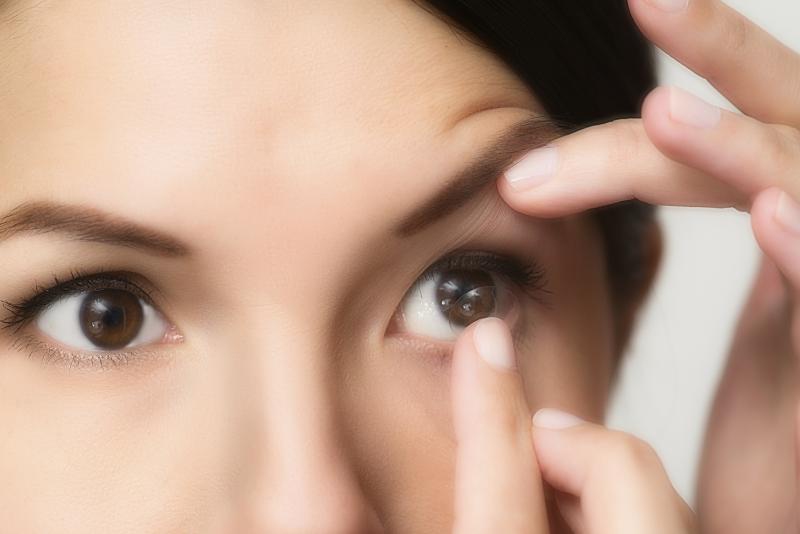Ideally you should have comfortable, clear vision with your new contact lenses as that is the reason why you use them. However, sometimes, you may see things somewhat blurry. The article presents some possible reasons (and also solutions) to why your vision becomes blurry while you are wearing contacts.

Why Are My Contacts Blurry?
Buildup of protein: One of the most common reasons of blurriness of contacts is the buildup of protein on the lens surface. Your eyes are designed to be cleaned naturally by tear production. Wearing contacts disrupts this process; hence, the oils and proteins found in the tears tend to attach to the microscopic grooves present in most of the contacts. Moreover, any outside contaminant that would have been cleared normally would also attach to the contact lens. After some period of time this build up forms a film on the top of the contact lens, thereby, causing blurry, cloudy and distorted vision.
Cloudiness due to dry-eye: Blurry and foggy contacts may also occur due to dried-out and inflamed eyes, a typical presentation of dry-eye syndrome. Not only the vision becomes cloudy due to dry-eye syndrome but also it makes the eyes prone to damage and infection.
Deterioration of the lens: Why are my contacts blurry? Deterioration of the contact lens can also result in this problem. The causes of this include scratching the lens externally, wearing a lens for a longer duration than it is designed for, or washing the lens with corrosive chemicals. It’s quite important that you wash your contact lens with the proper saline solutions, because improper chemicals not only destroy the lens but also cause damage to your eyes when you apply the lens later on.
Rotation or movement of the lens: To provide a clear vision, the position of the contact lens should be in the center of your eye. If the lens rotates or moves around in your eyes, you will most probably suffer from blurring of vision, especially those individuals who are suffering from astigmatism. If you feel that there is a movement or rotation of your contact lenses and you can’t get it right by yourself, you should get the fit of the lens adjusted by your doctor or they may switch you to a different lens.
Increase in Prescription: You may get your eyes examined by an optometrist either in a year or every 2 year; hence, you tend to buy a large supply of contact lenses at the same time. Now if your vision gets worse throughout the year, you will find that your contacts are becoming blurrier and blurrier. Hence, it is advised that you buy smaller supplies at one time.
Inverted Contacts: An inverted contact lens in your eye can be very uncomfortable and your vision can be quite blurry. However, the fix for this is quite easy. Simply remove the lens, flip and re-insert.
Wrong Prescription: Your optometrist measures your prescription from glasses. This is different for contact lenses, which need to be converted from prescription for glasses using a formula or a conversion chart. Hence, if you are wondering why are my contacts blurry, the reason may be that the prescription for your contact lenses were not converted from the prescription for your glasses. This conversion becomes more important if you have a high prescription.
Contacts in the wrong eye: One of the reasons for blurriness of contact lens could be that you have switched the contacts of your right and left eye inadvertently. If you think that this may be the problem, then try switching the lenses and see if the problem is resolved. You can try with a fresh pair and still if you feel that your vision is blurry then consider some of the other reasons mentioned in this article.
Poor fitting (Colored contacts): The only clear portion on a colored contact lens is a small circular area present in the middle of the lens. Hence, they must be properly fitted into the eye in order to see you clearly through them.
It Can Be a Health Problem of the Eye
If you experience blurriness of vision even after the removal of contacts, then it could be due to more serious health problem of the eye such as swelling, inflammation, infection of the cornea, cataracts, problems of the retina or many other conditions. Corneal problems such as superficial Punctate Keratitis (SPK) caused due to contacts can result in cloudiness of cornea and could be the reason of why are my contacts blurry. You should visit the eye doctor immediately. You may need medicated eye drops for your eyes and the condition can take weeks to months to resolve completely.
Change Your Routine
If you take proper care of your lenses but still have blurring of vision, it is quite possible that you have to bring a change to your routine. You may require a new prescription, try another brand, or try switching to another brand of contact solution. You should discuss the various options with your eye physician so as to ensure proper care and fit as switching contact solutions may sometimes cause irritated, dry eyes.
When to Visit a Physician
If the blurry vision is due to wrong prescription, schedule an eye exam to update your prescription. Vision can deteriorate due to age and those suffering from astigmatism may experience changes every year and require change in prescription.
View All Comments /Add Comment